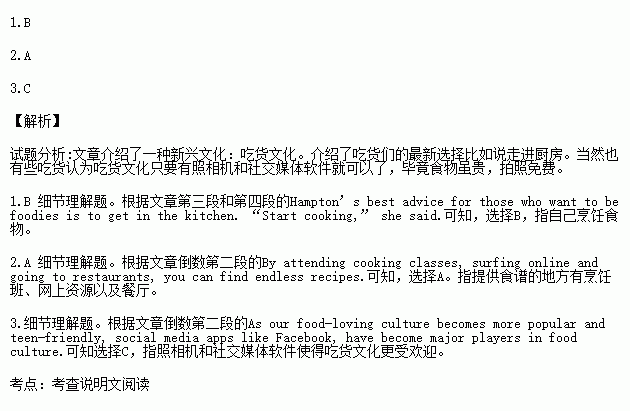题目内容
You may have noticed something different when you ate at your favorite restaurant. Or perhaps you picked up on it while looking through your social media apps (社交媒体软件) . You guessed it ---we’re becoming a foodie (吃货) culture.
For some, that means photographing every dish, but others are taking it one step further. Sophia Hampton, a senior at Staples High School in US, chooses to make her own food. She has been published in Future Chefs, a cookbook of recipes (食谱) by teens.
Hampton’s best advice for those who want to be foodies is to get in the kitchen.
“Start cooking,” she said. “There are so many resources online, like recipes and articles about food. Go to your local farmers’ market and start cooking with them.
Besides blogs and online resources, there are also hands-on cooking classes for students. The Chopping Block, a Chicago cooking school, offers many different classes for teens, including courses on chocolate and French food.
By attending cooking classes, surfing online and going to restaurants, you can find endless recipes. But sometimes becoming a real foodie means being behind a camera. As our food-loving culture becomes more popular and teen-friendly, social media apps like Facebook, have become major players in food culture.
“Getting involved in foodie culture is as easy as having a camera and a social media app,” one foodie said. “I always go to streets and farmers’ markets to take beautiful pictures of food. Wherever food prices are expensive, the photos are free.”
1.What does Hampton advise those who want to be foodies to do?
A.Post their recipes online.
B.Cook food by themselves.
C.Eat at their favorite restaurant.
D.Take photos of every dish they eat.
2.Where can students find new recipes, according to the article?
①cooking classes ②online resources
③new restaurant ④public libraries
A.①②③ B.①③④
C.②③④ D.①②④
3.What has made foodie culture more popular, according to the article?
A.People’s growing interest in traditional culture.
B.The convenience of getting different food.
C.The use of cameras and social media.
D.The drop in food prices.
 快乐小博士巩固与提高系列答案
快乐小博士巩固与提高系列答案
